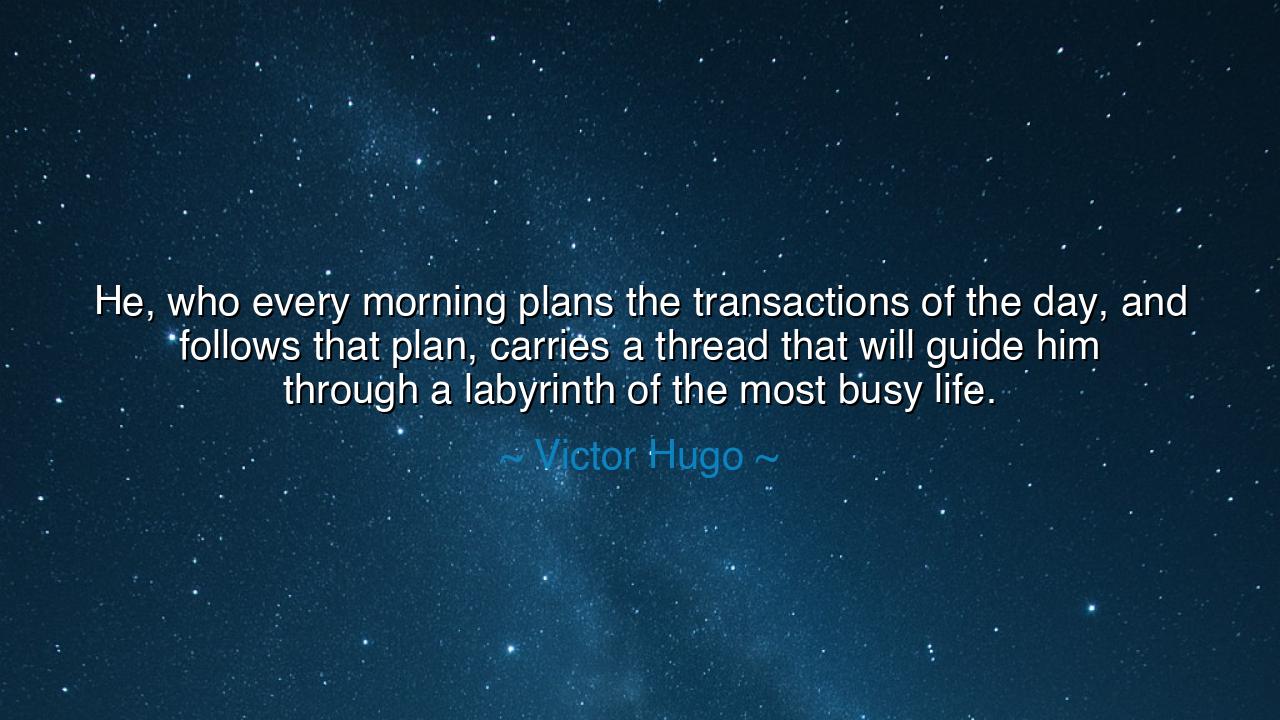
He, who every morning plans the transactions of the day, and
He, who every morning plans the transactions of the day, and follows that plan, carries a thread that will guide him through a labyrinth of the most busy life.






The immortal poet and prophet of order amidst chaos, Victor Hugo, declared: “He, who every morning plans the transactions of the day, and follows that plan, carries a thread that will guide him through a labyrinth of the most busy life.” In these words, we are given an image not merely of planning, but of survival. Life, Hugo says, is a labyrinth, twisting and confusing, full of distractions and sudden turns. Yet the one who begins the morning with intention holds in his hand a guiding thread, like Theseus in the myth of the Minotaur, able to find the path through darkness and complexity.
This quote reveals the power of discipline and preparation. To drift into a day without direction is to wander the maze without a map, at the mercy of every temptation and interruption. But the one who wakes and lays out his course does not drift; he steers. He transforms the endless complexity of life into a series of steps, small victories that lead to the heart of his purpose. Hugo, who himself endured exile, political storms, and the burdens of genius, knew that order of mind was the shield against chaos of circumstance.
History abounds with those who practiced this wisdom. Benjamin Franklin, one of the fathers of a nation, began each day with the question: “What good shall I do this day?” He divided his hours with precision, balancing study, labor, and rest. This daily planning was not mere routine—it was the rope that pulled him through a life of invention, diplomacy, and creation. Like Hugo’s vision, Franklin showed that a man armed with a plan is never lost, no matter how crowded or demanding the world becomes.
Even in war, the lesson holds. Napoleon Bonaparte, though often reckless in ambition, was meticulous in daily preparation. His mornings were spent reviewing reports, issuing precise instructions, and setting the rhythm of armies. To his soldiers, the battlefield was chaos, but to him it was a design, because his plan served as the guiding thread through the fog of war. So too in our lives: to plan is not to predict all outcomes, but to give oneself direction even when confusion surrounds.
The meaning of Hugo’s words is not that life can be controlled entirely—for no plan survives unchanged—but that the act of planning gives strength. It grants the mind a compass, a sense of purpose, a standard against which to measure the day’s distractions. Without it, the labyrinth overwhelms; with it, even detours are understood as part of a larger design. The thread does not remove the maze, but it ensures the traveler will not be lost.
The lesson for us is profound: rise each morning with thought, with clarity, with purpose. Write your tasks, speak your goals, decide the shape of the day before the world shapes it for you. Follow that plan with discipline, and even when the unexpected comes, return to your thread. Practical action is simple: begin each day not with haste, but with reflection. Take a few moments to order your life, and you will discover that the hours no longer scatter, but unite into meaning.
Thus, Hugo’s quote stands as a guide for all generations. It teaches that in the midst of busyness, the mind that plans carries the key to freedom. It tells us that the labyrinth of life, vast and confusing though it is, can be navigated by those who rise with discipline and intention. Let us then grasp the thread each morning, and with steady steps, walk boldly through the maze, knowing that our plan will carry us safely to the light.






AAdministratorAdministrator
Welcome, honored guests. Please leave a comment, we will respond soon